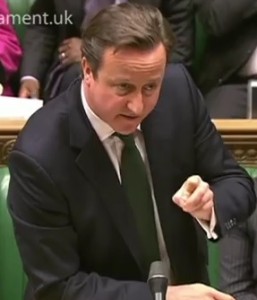
Prime Minister’s Questions, the weekly opportunity for MPs to grill David Cameron in Parliament on anything and everything, is usually an occasion for highly political shouting matches and “Hear hears” on largely domestic issues. While this week was no exception, it was great to see an MP ask about international development issues at this crucial time. David Blunkett MP, former Labour Education Secretary, used the opportunity to ask the Prime Minister about his leading role in the UN’s High Level Panel on the Post-2015 successor framework to the Millennium Development Goals…

“What progress has been made by the high-level panel on the development of priorities for the millennium development goals after 2015?“
Mr Blunkett went on to highlight that people with disabilities were one group who had been left behind from much development progress. This is, of course, an issue RESULTS grassroots activists have campaigned about for many years. ‘Disability’ was not mentioned in any of the MDG goals, targets or indicators. Yet there are around 1 billion people living with a disability making up about 15% of the world’s population, and a disproportionate number of the people living in developing countries are disabled because of the close links between poverty and disability. Meanwhile, it is estimated that being a disabled child more than doubles the chance that you will never enroll in school in some countries.
“…Will the Prime Minister identify one group of people who were not included in the millennium development goals and who are often excluded from society and education-those severely disabled young people who face grinding poverty, ill health and the disadvantage of those disabilities? Will the Prime Minister give priority to them in developments over the next two years?”
The Prime Minister’s response was good news. He confirmed: “The right hon. Gentleman makes a very good point about helping disabled people across the world, and we should make sure that the framework we look at properly includes those people.”
And more good news – he also gave a strong defence of the Government’s pledge to reach 0.7% of Gross National Income spending on aid and development, which has come in for criticism ahead of next week’s budget statement….

“On the wider issue of our aid budget, I know it is contentious and I know it is difficult, but I believe we should not break a promise that we made to the poorest people in our world. To those who have their doubts I say that of course there is a strong moral case for our aid budget, but there is also a national security case. It is remarkable that the broken countries-countries affected by conflict-have not met one single millennium development goal among them. By helping to mend those countries, often through security work as well as aid work, we can help the poorest in our world.”
We’ll be keeping a beady eye on next Wednesday’s budget speech by George Osborne in the hopes that the Prime Minister’s fine words are confirmed in the latest spending plans. And we’ll also be watching closely as the Prime Minister heads to Indonesia in a few weeks time for the final meeting of the UN’s High Level Panel on Post-2015. Let’s hope they do indeed propose a new framework of development goals that truly includes people with disabilities and other vulnerable groups.
You can watch Prime Minister’s Questions here.